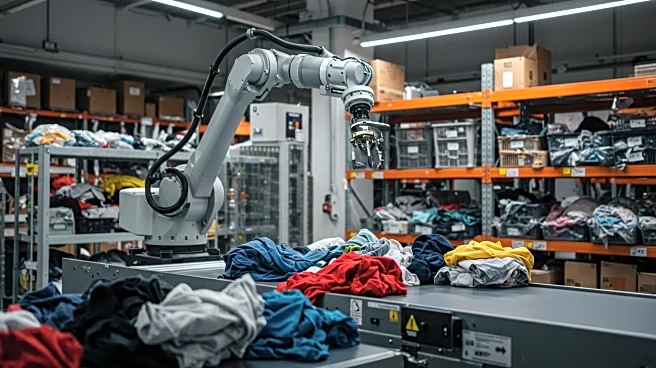What's Happening?
ThredUp, a leading resale platform, has reported profitability for seven consecutive quarters in the U.S., with a 74% increase in new customers year-over-year in Q2. The company's success is attributed to its strategic pricing and customer experience, alongside favorable economic conditions. Advances in AI and the closure of the de minimis loophole have bolstered ThredUp's position, allowing it to offer domestic goods immune to tariffs. The resale model benefits from increased costs for fast fashion, making secondhand apparel more appealing. ThredUp's Chief Strategy Officer, Alon Rotem, highlights the platform's ability to domesticate its supply chain, enhancing its competitive edge.
Why It's Important?
ThredUp's growth underscores the rising popularity of resale platforms, driven by economic pressures and technological advancements. As tariffs impact traditional retail, consumers are seeking value in secondhand goods, boosting the resale market. AI's role in optimizing operations and customer engagement further enhances the appeal of resale platforms. This trend challenges fast fashion, potentially leading to shifts in consumer behavior and retail strategies. The success of ThredUp may inspire other companies to explore resale models, impacting the broader retail landscape and promoting sustainability.
What's Next?
ThredUp plans to leverage its profitability to expand its offerings, including a peer-to-peer platform. The company aims to capitalize on AI advancements to enhance its operations and customer experience. As resale becomes mainstream, traditional retailers may need to adapt, potentially increasing collaborations with resale platforms. Regulatory changes could further impact the market, influencing tariffs and trade policies. The continued growth of resale may lead to increased investment in technology and sustainability initiatives, reshaping the future of retail.
Beyond the Headlines
The rise of resale platforms raises questions about consumerism and environmental impact. It challenges the fast fashion industry, pushing for more sustainable practices. The focus on value and domestic goods may influence cultural attitudes towards consumption, emphasizing quality over quantity. As AI plays a larger role in retail, ethical considerations around data privacy and automation emerge. The trend could also impact employment, with potential growth in jobs related to resale and technology-driven retail solutions.










